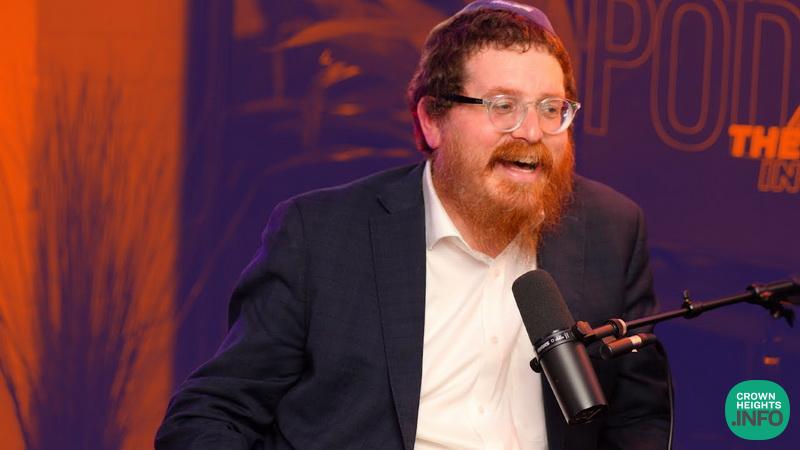
Rabbi Zvi Boyarsky Of The Aleph Institute Joins The Jason Ingber Podcast
As I wrangle Rabbi Boyarsky from his office to the podcast studio, he asks me if I kept our deal and put tefflin on every day for a hundred days. I respond, “I’m not perfect, but I substantially complied.” Rabbi Boyarsky snaps, “I disagree. You are perfect.”
Rabbi Zvi Boyarsky has a lot on his shoulders. He’s a director for the Aleph Institute –or Aleph– as their employees and clients call it. Aleph is a humanitarian nonprofit org for prisoners’ rights.
Rabbi Boyrasky’s signature is an unfailing smile. But the first night I began to do work for Aleph, he looked like he hadn’t slept or smiled in a week.
I asked what has been keeping him up all night. The question energizes him.
“There’s a Holocaust going on right now in Afghanistan.”
This was the summer of 2021. The United States had for decades artificially shored up Afghanistan, and suddenly the U.S. military presence vanished. I knew this much from the news but didn’t understand the urgency in Rabbi Boyarsky’s dark green eyes.
He said: “Taliban gunmen control Kabul’s airport. These terrorists are going door to door hunting down judges that prosecuted them, especially the women judges. Taliban are slaughtering women for having the audacity to be judges. We’re trying to get them out.”
Reb Zvi was talking about using political connections Aleph had developed with Qatar, a rich neighboring Arab country with influence over the Taliban, to coordinate bus transport of a hundred women judges and their dependents to Pakistan. I wanted to help.
“What can I do?”
I learned that Aleph had been working on this nonstop since Rabbi Boyarsky saw the news unfold. They had linked with a Baroness in London (Helena Kennedy, Queens Counsel, and Director of the International Bar Association’s Human Rights Institute (IBAHRI)) as well as U.S.-based, International Association of Women Judges who had their members in Afghanistan at mortal risk.
The Taliban had publicly called for the killing of many of these judges. The terrorists were bombarding the judiciary members’ phones with death threats and videos of them murdering other judges. They were out for blood. Their lethal attacks were aimed on these judges because they had ordered them behind bars for rape, murder, or lesser crimes. Now these criminals were free and suddenly in power. Under chaos, darkness, and gunfire the women were running with their families to safehouses to avoid capture.
Rabbi Boyarsky’s efforts with many others chartered planes filled with refugees to Greece and the U AE. Next, Aleph and the IAWJ are linking families with government officials for visas. Many judges found refuge in Germany and Canada who have been more receptive to admitting Afghan refugees. Justice Susan Glazebrook, acting Judge for the Supreme Court of New Zealand and President of the IAWJ, as well as the immediate past president of the IAWJ, Judge Vanessa Ruiz of the District of Columbia Court of Appeals led this endeavor with Aleph. Aleph turned its focus on the United States to lift asylum red tape. (Notice how in a big way this was a women-helping-women effort, which is its own dimension of inspiration.)
One Aleph donor is a Hasidic Jew that prefers to keep a low profile. He provided the primary resources to assist one chartered plane. He wished to refer to the evacuation operation as “Schmendel” a nonsensical Yiddish word. His goal was to draw attention far away from his involvement, associates, and money he generously contributed to the mission. This resulted in some broken telephone that made the Afghan refugees believe that the person’s actual name that funded the plane was Schmendel. Thus, they held signs and took pictures of themselves on the plane and in Greece thanking Aleph and Mr. Schmendel.
These Afghan judges were at the height of their society, and they had risked a lot to get there, and suddenly they found themselves with nothing, with a new need to rebuild lives from scratch in foreign lands. My grandparents survived the Holocaust and had to do this with no outside help. Nothing can erase the events that caused the plight of these people but knowing that there are people are out there fighting to help and doing whatever they can to help must be inspiring to them. It’s inspiring to me.
Rabbi Boyarsky embodies the Aleph slogan: No one forgotten. No one left behind.
I was introduced to Rabbi Boyarsky through Rabbi Yitzy Horowitz. A special person that has created community for me and my family and for whom I’m very grateful.










